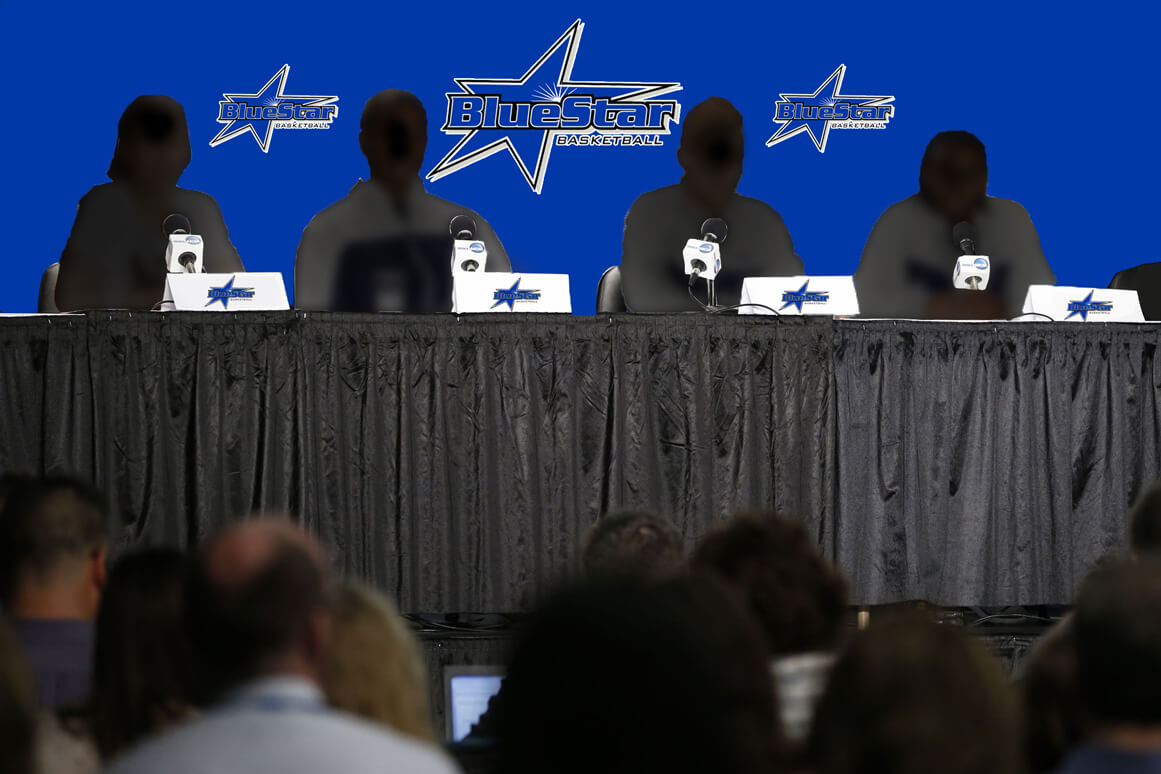High-fives were everywhere.
With Agnus Berenato in the room, just about everyone got at least one high-five during her introduction as the new women’s basketball coach at Kennesaw State University.
Men’s basketball coach Al Skinner got a high-five. So did Daniel Papp, the somewhat startled president of the university, as he greeted her.
Her former Georgia Tech players in attendance got high-fives. So did her new players at Kennesaw State. Sportswriters, too.
This is how Berenato rolls, and as she and her now all grown-up family rolled back into Georgia in early April, the folks at her new place of employment got a glimpse of the sense of fun and energy that is at the core of what she does as a coach.
“Yes, we are going to get a ring. Yes, we are going to cut the nets down,” Berenato said in highly spirited introductory remarks.
But, she added, none of that compares to former players and staff she’s worked with over the years, at Rider, Georgia Tech and Pittsburgh, and “the heart, the spirit, the loyalty and the love” they’ve shown her and her family in return.
Having covered Berenato for most of the last 20 or years or so, these are absolutely sincere, authentic sentiments. There’s nothing subtle about any of this, nor does she waver in allowing the emotions to come gushing forward.
About a dozen of her former Georgia Tech players, including WBCA executive director Danielle Donehew, were on hand. So was retired Georgia Tech athletics director Homer Rice. Berenato alternately had everyone reeling with laughter and nodding their heads as they listened to her plans for making the Atlantic Sun school competitive in women’s basketball.
“I’m so excited that we’re going to get to do something that Dr. Papp, [KSU athletics director] Vaughn Williams and the whole Kennesaw State community believes in,” Berenato said.
I don’t know what the half-dozen Kennesaw State players in attendance thought, but I hope these young women will be able to enjoy playing basketball again.
The last couple of seasons have been pure turmoil for them on the suburban Atlanta campus, which is the third-largest public university in Georgia.
Kennesaw State is among the dozen or so women’s Division I programs that have come under fire or been investigated since 2010 for allegations of player mistreatment by coaches.
Berenato succeeds Nitra Perry, who was the subject of an internal athletics department probe at the end of the 2014-15 season. KSU officials found no NCAA or university violations after complaints by two former players and the parents of another of physical and verbal abuse by Perry. The school dismissed Perry in March, after the Owls had their third losing season in her four years on the job.
Like some of the instances that have made recent headlines—at Nebraska, Loyola-Chicago, Duke and elsewhere—there’s a mixed opinion from former Kennesaw State players about what happened, and whether what Perry was accused of constituted abusive behavior.
Some defended Perry, chalking up the resentment to players not getting playing time, or not liking how the coach was challenging them to get better.
These are among the reactions that have been expressed at some of the places where other investigations have been going on or continue.
Compared to Nebraska and Loyola, where most of the current rosters were in uproars over Connie Yori (resigned at the former) and Sheryl Swoopes (that probe is underway), what has transpired at Kennesaw State doesn’t rise to such a dramatic level.
However, all of these cases, while not related, are disconcerting. While all allegations must be taken seriously, it’s often hard to discern what’s abusive behavior and what’s simply tough, gruff mannerisms and language coming from old-school coaches.
Oregon State may be the clearest-cut case of over-the-top abuse when LaVonda Wagner was fired in 2010, after only two scholarship players remained and several assistants had left.
As we all know today, Scott Rueck rebuilt the Beavers in a very different manner, and they reached the Women’s Final Four. It’s not an exaggeration to say he’s been a miracle worker, but other programs entangled in mistreatment allegations have struggled to resume any basketball success they may have had.
Boston University was a force in the America East Conference under Kelly Greenberg before she became the subject of player complaints of being abusive. Other former players adored her, saying they liked her “tough” style.
Was she a bully or just too hard-nosed for some players? That’s a question left unanswered even after Greenberg was forced out in 2014.
Similar questions abound at Wichita State, where former Tennessee guard Jody Adams has been the subject of player complaints, departures and an internal probe.
That investigation was completed in early 2015, after a school-record 29-win season, and as Adams was mentioned as a possible candidate for the Kansas job. The Wichita State athletics department instituted changes to open communications between players and the staff and have a sports psychologist work with the program.
The Shockers were 7-22 this past season, the fewest wins in Adams’ eight seasons, after having lost several seniors as well as transfers.
The latest batch of allegations have been head-turning in other ways. Nebraska and Duke have been among the most successful programs in the country in recent years. Swoopes, newly elected to the Basketball Hall of Fame, has been accused of being abusive and too involved in her players’ lives off the court.
Then there’s a racial discrimination lawsuit filed this week by former Iowa State player Nikki Moody against coach Bill Fennelly, the university and the state.
A number of former Cyclones rushed to Fennelly’s defense, as did parents of some African-American players who played for him in Ames.
Like the 2015 investigation at the University of Illinois, Moody’s claims against Fennelly are disturbing.
I’ve known Bill for years and he’s got a blunt style, to be sure. While I’m not black, I find what’s being alleged hard to believe.
Maybe that’s my blind spot, but I shudder to think what’s on the minds of women’s coaches everywhere as they learn about more and more cases like this.
Do my players feel this way too? Are some of them planning to rise up against me? What recourse do I have? Have I really done something to warrant this? Have I lost the trust and support of my team? Some coaches may not be aware of any signs of disconnect.
I’ve got a lot of questions too, none that can easily be answered.
It is too simple to chalk up the misunderstandings to differences between baby boomer coaches and millennials whom some think have been “coddled” their whole lives?
When Ronda Rompola, who’s 55 (my age) announced her retirement at SMU in March, she made a direct reference to what she called an “entitled” generation of kids who “are not as coachable as they were years ago.” That’s not a new charge.
Nor is it new to wonder why male players don’t go public about abusive coaches like young women have. Are females more sensitive to a verbal barrage? Do some take instruction more personally? Do guys more readily accept that being yelled at, even post-Mike Rice, is part of being an athlete?
In the late 1990s, UMass coach Joanie O’Brien was the subject of complaints of verbal abuse and was sued by three former players. She was dismissed in 2002, and since then, so much has changed on the women’s college hoops scene.
Money and salaries have gone up, along with the pressure to recruit and win. How well do coaches and players really get to know one another before they’re thrown together in a college program where the ideal “cultural fit” may not exist?
The generational divide has been starker than many of us oldsters initially realized. In my own profession, the priorities, values and attitudes of some millennial journalists I’ve dealt with have really taken me by surprise.
I can’t imagine how college coaches, whose livelihoods depend on how well they teach and motivate these young people, are grappling to understand them.
As a Des Moines Register story concluded in the wake of the lawsuit against Fennelly and Iowa State:
“It’s clear that the landscape has shifted in college sports, with athletes more vocal about asserting their rights and coaches being put on notice to police the way they interact with players.”
The landscape has become a minefield that figures to be littered with misunderstandings, complaints and allegations, potentially anywhere. I don’t want to overdramatize this point, since there are hundreds of schools where players and coaches appear to be in harmony.
But it’s also fair to wonder why seems to be quite a bit of unhappiness in women’s college basketball. Sports Illustrated attempted to answer this question last fall, but since then more allegations have sprung up.
When your sport is making headlines on Deadspin, The Big Lead and other outlets that normally don’t cover women’s hoops, that’s not good. Ditto for when “Outside the Lines” comes calling.
All I know for now is that at Kennesaw State, the Division I school closest to where I live, the players are in for a real treat with Berenato.
She told me she hasn’t spoken to her new players about what happened before she got the job, nor does she plan to.
It’s about moving forward, and in a positive way, and she’s about as upbeat as any coach I’ve ever known. I’ve never heard of any complaints of mistreatment. Absolutely none.
In my time covering her at Georgia Tech, Berenato brought in quality kids with a lot of character, and expected high standards of behavior from them, on and off the court.
She also turned some raw talent into really good basketball players, such as Sonja Mallory, who became an all-ACC center at Tech and played in the WNBA, and Shavonte Zellous, who led her Pitt teams to the Sweet 16 and also has played in the pros.
Certainly Berenato had differences of opinion with some players, most notably Niesha Butler, a high-maintenance former New York City prep star who was suspended for academic reasons and who abruptly quit the Yellow Jackets before her eligibility was gone.
And yet, in this meeting room on the Kennesaw State campus, there was Butler, chatting with her old coach’s new players. There was a lot of laughter between them.
That’s a hell of an endorsement, well beyond the laughter.
Wendy Parker is a sportswriter and web editor who has covered women's basketball since the early 1990s. She is a correspondent for Basketball Times and formerly covered women's and college sports, soccer and the Olympics at The Atlanta Journal-Constitution. She is the author of "Beyond Title IX: The Cultural Laments of Women's Sports," available on Amazon, and the creator of Sports Biblio, a blog about sports books and history.




